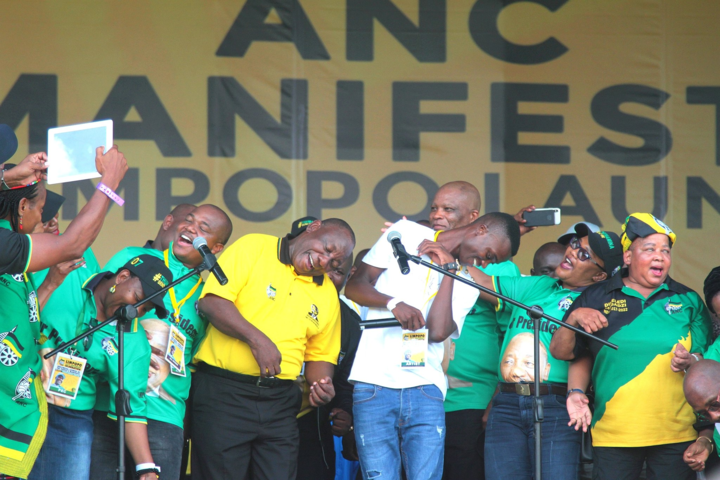
ANC President Cyril Ramaphosa at the rollout of the ANC manifesto in Limpopo. (Image via ANC Twitter)
Multimedia · User Galleries · News in Pictures Send us your pictures · Send us your stories

ANC President Cyril Ramaphosa at the rollout of the ANC manifesto in Limpopo. (Image via ANC Twitter)
Multimedia · User Galleries · News in Pictures Send us your pictures · Send us your stories

While it is not easy to oust a sitting ANC president outside of the party's national conference held every five years, it is possible. The question is: Can the Zuma-ites do it, asks Melanie Verwoerd.
Last week I wrote about the difficulty President Cyril Ramaphosa could face in a post-election Parliament. But Parliament is not the only difficulty that he could potentially face – especially if the ANC does not secure a large majority (greater than 57%) at the polls.
Apart from a vote of no-confidence in Parliament, Ramaphosa could also face a massive challenge from inside the ANC.
It is well-known that the Zuma faction has not disappeared since the election of Ramaphosa as president at the ANC's Nasrec conference. They are fighting back – big time. So vicious is the fight that the ANC has not even been able to keep it under wraps until after the elections.
The Zuma faction is making no secret of the fact that they want to get rid of Ramaphosa – the sooner the better. They argue that Ramaphosa's win by 179 votes at the Nasrec conference was unconvincing. They are increasingly claiming that the victory was "stolen" due to the disqualification of 220-odd delegates on the first day of the conference, following various court cases in the weeks leading up to the conference.
The question is: Can they do it?
While it is not easy to oust a sitting ANC president outside of the party's national conference held every five years, it is possible.
The ANC holds a national general council (NGC) no later than 30 months after the national conference. The NGC does not involve any elections although the conference can fill vacancies in the national executive committee (NEC), provided that such vacancies do not exceed 50% of the NEC.
The purpose of the NGC is to discuss reports of the NEC as well as review decisions taken by the various constituent bodies of the organisation. These decisions can be rescinded and altered except if they were taken at the national conference – those can only be changed at the next national conference.
Some in the Zuma faction argue that the election of Ramaphosa and the top six is not technically a decision taken by the national conference and could thus be rescinded at the NGC. Of course, the Ramaphosa faction argues the opposite.
Whatever the case may be, the ANC constitution does allow for the "evaluation of members of the NEC" which of course includes Ramaphosa. Herein lies the real danger.
The Zuma faction will undoubtedly viciously criticise the president for his performance on issues such as expropriation without compensation, privatising the Reserve Bank (if it had not yet happened by then), the problems at Eskom, civil service job losses and, most importantly, the party's election performance if the ANC does not get a large majority in May.
Based on a negative evaluation of his performance, they could then propose a resolution criticising his performance. This might not sound like much but it could have far-reaching ramifications.
Rule 29 of the ANC constitution states that a "Special Conference of the ANC may be convened by the NEC at any time or at the request of a majority of the Provinces for the stated purpose or purposes."
So even though the NGC would almost certainly not allow the removal of Ramaphosa, a negative evaluation of his performance might just be the trigger for five provinces to ask for a special/early general conference with the intention of passing a vote of no-confidence in him and thus recalling him.
At this stage it looks unlikely that they would be able to gain the support of five provinces, but this could change if the ANC's election majority is not close to 60%.
Although a large election majority would not necessarily stop the Zuma faction's attempts to dispose of Ramaphosa, it would make it a lot more difficult to succeed. The ANC still takes the idea of a public mandate very seriously (in theory, at least) and thus a win of close to 60% would make it very difficult for the Zuma faction to argue that Ramaphosa doesn't have the trust of the majority of people in the country – irrespective of his small majority at the Nasrec conference.
Secondly, there is nothing like a big election win to bolster the mood of the ANC branches. Many, if not most, of branch executive members are also local government councillors. A big election victory in May would make them more confident of retaining their positions in the upcoming local government elections, and less likely to support a move against the president.
A small election majority (55% and below) could have exactly the opposite effect, steering this country into very troubled waters. There is no question that should Ramaphosa be recalled by the ANC and replaced by a Zuma-ite, our markets and currency would react extremely negatively, possibly even collapse. Of course, many argue that the Zuma faction wouldn't care, as long as they could stay out of jail and keep raiding the state coffers.
In such a scenario it would most probably be time to switch the lights off – except of course that Eskom would have done it already.
- Melanie Verwoerd is a former ANC MP and South African Ambassador to Ireland.
Disclaimer: News24 encourages freedom of speech and the expression of diverse views. The views of columnists published on News24 are therefore their own and do not necessarily represent the views of News24.